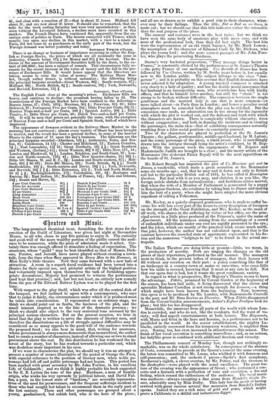tittrto out 3guffir.
'The long-promised theatrical treat, furnishing the first stone for the .erection of the Guild of Literature, was given last night at Devonshire House, to all who chose to pay five guineas to enjoy it. The curiosity and good-will of the more wealthy portion of the public caused the audi- ence to be numerous, while the price of admission made it select. Cer- tainly there was enough offered to stimulate a feeling of expectation. The amateurs, whose " guild " may be best identified as that of Messrs. Dick- ens, Forster, and Jerrold, have never played without creating a town- talk, from the time when they appeared in Every Man in his Humour, at Miss Kelly's little theatre. Now they came forward with a now halo of attraction. A room in a superb ducal residence had been turned into a theatre for their special use, and pictorial artists of the highest position had voluntarily imposed upon themselves the task of furnishing appro- priate decorations; Majesty had promised to witness the performance (and kept that promise) ; and, last but not least, an entirely new comedy from the pen of Sir Edward Bulwer Lytton was to be played for the first time.
With respect to the play itself, which was after all the central dish of the banquet, we feel inclined to agree with a contemporary, who says that to judge it fairly, the circumstances under which it is produced must be taken into consideration. If represented on an ordinary stage, we think we should point out as faults, the haziness of the plot, and the small interest inspired as to the fate of the dramatis personae ; we think we should also object to the very oratorical tone assumed by the principal serious characters. But on the present occasion, we bear in mind that the play is written to serve the interests of literary men, and therefore the dissertations on a life of struggle against difficulties may be considered as so many appeals to the good-will of the audience towards the proposed fund ; we also bear in mind, that, writing for amateurs, -whose government is always more democratic than monarchical, the author had to create a number of characters, instead of allowing one or two to stand preeminent above the rest. By this distribution he has weakened the in- terest of the story, but he has worked towards a particular end, which was doubtless more important in his eyes.
. If we were to characterize the plot, we should say it was an attempt to present a number of scenes illustrative of the period of George the First, with especial reference to the position of literary men, when noble pa- tronage had left off and public patronage had not begun. This period has been marked with great accuracy by Mr. John Forster, in his excellent Life of Goldsmith ; and we think it highly probable his book suggested to Sir E. B. Lytton the tone of the play. Hardman, a man of humble origin, who works his way upwards by political labour, and David Fal- len, a poet, in the lowest state of "haeldsm," are severally representa- tives of the need for perseverance, and the frequent sufferings incident to those who had nought but talent to recommend them in the early part of the last century. These and other personages are grouped about a young, goodnatured, but rakish lord, who is the hero of the piece;
and all are so drawn as to exhibit a good side to their character, what- ever may be their failings. Thus the title, Not so Bad as we Seem, is made out; but we should say that this title indicates rather the ostensible than the real purpose of the piece.
The scenery and costumes were in the best taste; but we think we have seen the same body of amateurs play with more ease, and with more of the professional look, than they did last night. The best bits were the representation of an old timid baronet, by Mr. Mark Lemon; the assumption of the character of Edmund Curll by Mr. Dickens, who plays the young lord ; and the more earnest passages of Mr. John Fors- ter, who plays the persevering Hardman.


























 Previous page
Previous page